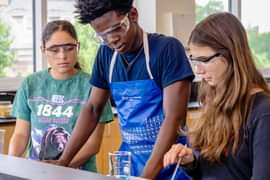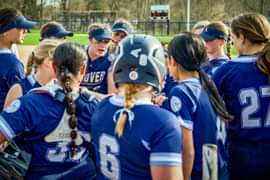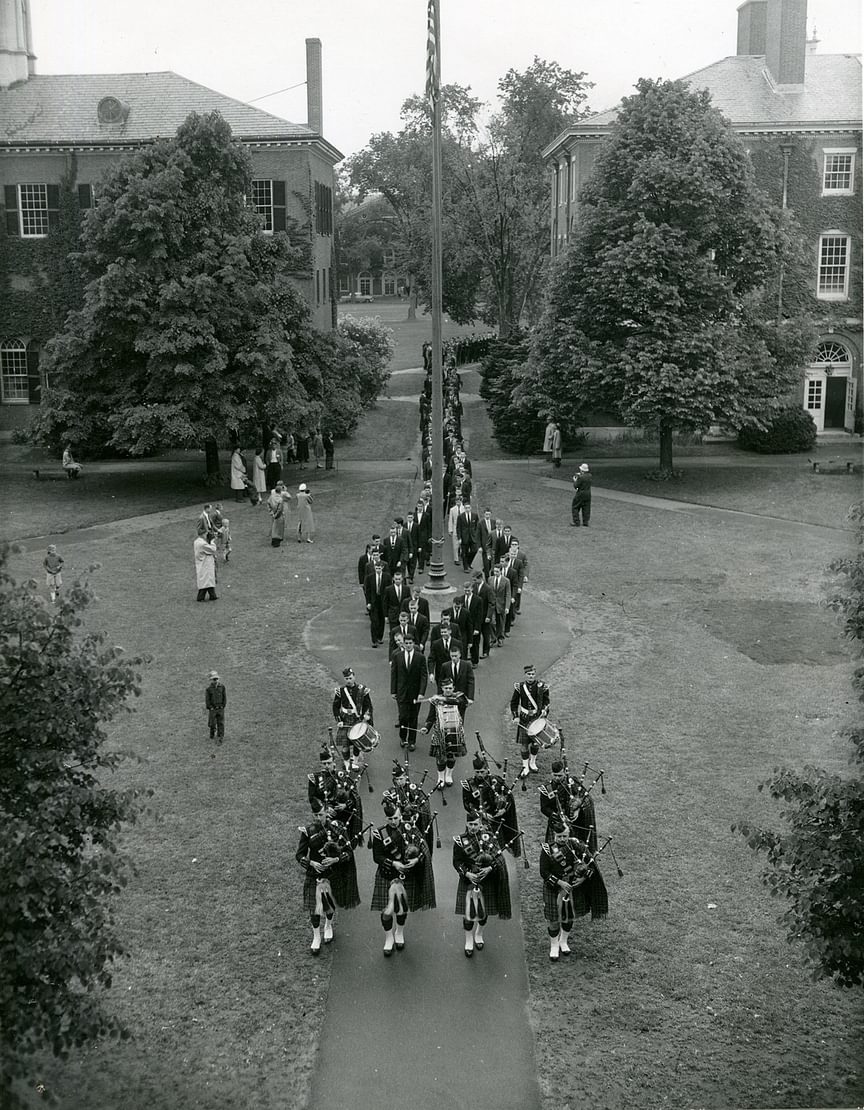
May 29, 2019
Circumstances of pomp
A look back at Abbot and Andover graduation speechesby Katie Fiermonti
Filled with wisdom, humor, and emotion, Phillips Academy and Abbot Academy commencement addresses are time capsules, illustrative of the past and rendering perspective to the present.
“You are going out into the far corners of the earth. You will come back wearing silver wings and colored ribbons, the symbols of your courage and resourcefulness. It is then, after victory and demobilization, that you will perceive how peaceful, and yet how important, this hilltop actually is.” So remarked Headmaster Dr. Claude M. Fuess to the Phillips Academy graduating Class of 1943.
That June 11th, Fuess was searching for the right words to speak to the young men assembled before him, boys destined to mature into America’s “Greatest Generation”— if they could survive the horrors of World War II. Seventy-six years later, Fuess’s words still resonate.
For nearly a century, the commencement speeches delivered at Phillips Academy and Abbot Academy have provided a fascinating glimpse into the zeitgeist—a reflection not only of the scholarly activity on campus, but also of the country and the world beyond. Regardless of the date delivered, the various headmasters, principals, and heads of school often concluded with common themes: utter faith in new graduates’ ability to change the world for the better, and a deep belief in the schools’ founding values of non sibi, youth from every quarter, and knowledge and goodness.
As Abbot Academy Principal Donald A. Gordon ’52 said in 1972, “Each year is different, and each one has a story.”
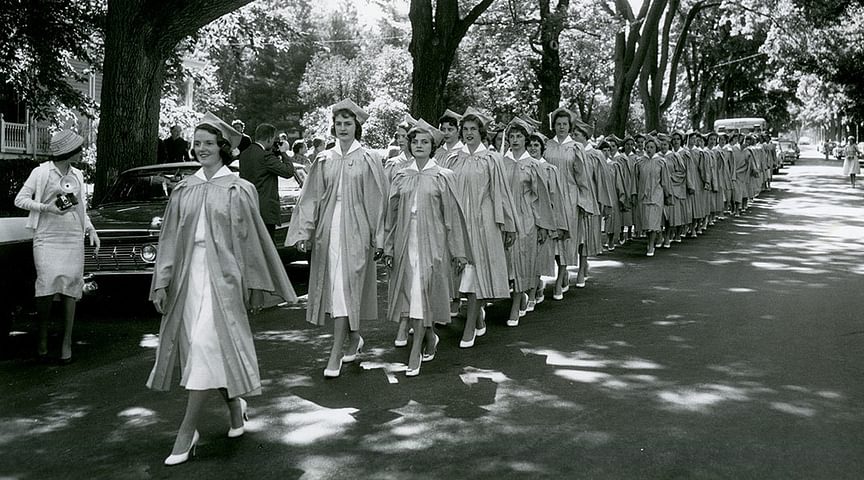
Rousing oratory has been a staple of graduations since the very first commencements at each school—April 20, 1779, for Phillips Academy (according to Fuess’s 1917 book An Old New England School) and 1830 for Abbot Academy (according to later-dated commencement addresses). In Andover’s early days, the traditional Commencement—or Exhibition, as it is also known—was held at the South Parish meetinghouse and featured sporadic and spontaneous Socratic inquiry, the presentation of awards for student essays, and the occasional brief religious-themed sermon from a visiting cleric.
The first record of what we now understand as a traditional commencement address at Abbot Academy is from 1940 and was given by Principal Marguerite Capen Hearsey.
War weighed heavily on the hearts of the graduating class. Though the infamous events of Pearl Harbor would not compel America into World War II for another 18 months, the young women listening to Hearsey’s address on June 3 had already borne witness to Hitler’s relentless march across Europe.
Hearsey encouraged her audience to “Keep faith—faith in man and God—which means the belief that good will triumph over ill. Keep hope….And love, for ‘all hope is vain but love,’ the only law by which mankind and nations can ever be free. There is little more that I can say…in this unprecedented and unpredictable world, than ‘good-bye’ with all its original, reverent significance—God be with you.”
Three years later, on June 11, 1943, Fuess would gravely address the graduating class, noting that they were “the first Andover senior class in a quarter century to live through an entire year of war preparation.”
Many of those awaiting their diplomas had replaced sports for on-campus military drills in preparation to join the Armed Forces. Fuess spoke of putting his faith in the young men before him and expounded on the gravity of their roles as future soldiers. “I confess that I look upon you as bearing the burden of this war. If you cannot build a Brave New World,” he said, “all hope for humanity is virtually gone.”
You will come back as alumni to tell me how the school should be managed. And when you return, you will be glad, I think, that places like Phillips Academy give an enduring quality to our civilization.
”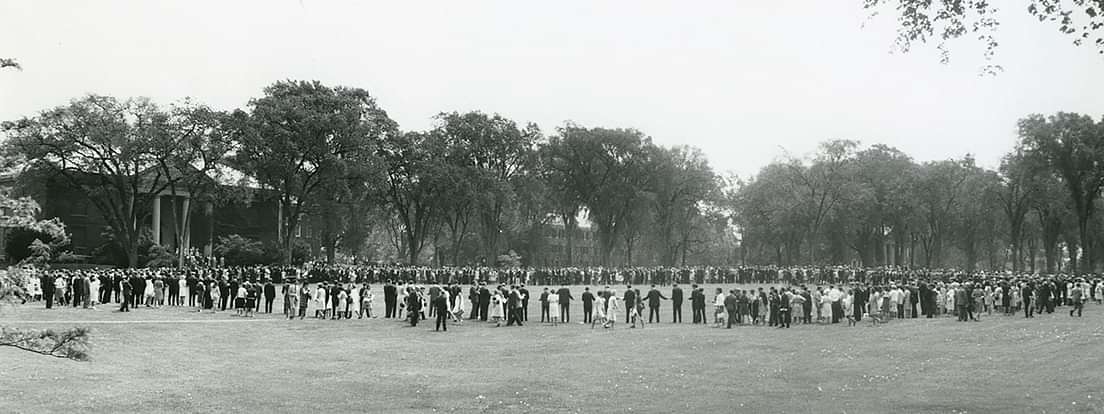
Ten years later, Headmaster John M. Kemper spoke to the Class of 1953 with a much more hopeful tone. These were young post-war Baby Boomers witnessing the end of the Korean Conflict, the rise of McCarthyism, and the discovery of the polio vaccine. Kemper talked about his hope for a classless society, saying:
“Communism is predicated upon class struggle, but how can there be a struggle between classes of society if there are no classes? The son of a bricklayer can become a doctor; an Andover scholarship boy became a Morgan partner and one of Andover’s greatest benefactors. If we consider ourselves as individuals, each one in his way different, yet all in some respects the same, we will hardly fall into the trap of trying to categorize ourselves into classes.”
Mirroring the unrest in American society, Andover too was wrestling with issues of class, race, and gender entering the 1960s and 70s. Headmaster Theodore R. Sizer’s 1974 speech—to the first coed class—implicitly called out “our institutional racism” at the school and in the nation. Citing the example of Russian nuclear physicist and dissident Andrei Sakharov, who advocated for intellectual freedom and human dignity, he urged the audience to take an “uncomfortable” look at the Academy and apply a “tonic of truth.”
“Andover is, alas, a racist school, benignly and genteelly so, but racist nonetheless,” Sizer said. “The Class of 1974 has led in taking some small steps toward making this a more honest and happier school. Better than any other symbol, you represent the alliance of two sister academies, Phillips and Abbot, that was accomplished this year. The true meaning of this alliance is the common concern of all humans, male and female, for scholarship, decency, and truth. Our similarities are more important than our differences.”
Sizer’s speech was tonally very different from the prior year’s commencement address by Donald A. Gordon, Abbot Academy’s principal, who gave a tongue-in-cheek address to the school’s last graduating class.
“My fair ladies…. I promise not to talk to you about any of the following: Phillips Academy, Abbot Academy, the merger, coeducation, or how you can save our country during your lifetime,” joked Gordon. “You may ask, but what else is there? Never fear, girls; have I ever truly been at a loss for words before?” He then spurred the young women to be faith-filled and hopeful, to put their heads down and get to work.
In 1982, at Andover’s 204th Commencement, Headmaster Donald W. McNemar focused his address on global peace and justice “in the midst of nuclear peril,” noting the Falkland Islands War between Great Britain and Argentina. “Hundreds of thousands of people are expected to demonstrate in New York next Saturday at the United Nation’s Second Special Session on Disarmament in support of a nuclear freeze. This campus, like many others throughout the nation, is being shaken into action on the nuclear question. As you leave Andover Hill, you take with you the two mottoes of this Academy: non sibi—not for self—but for others. May you bring justice to this divided world. [And] Finis Origine Pendet—the beginning determines the end.”
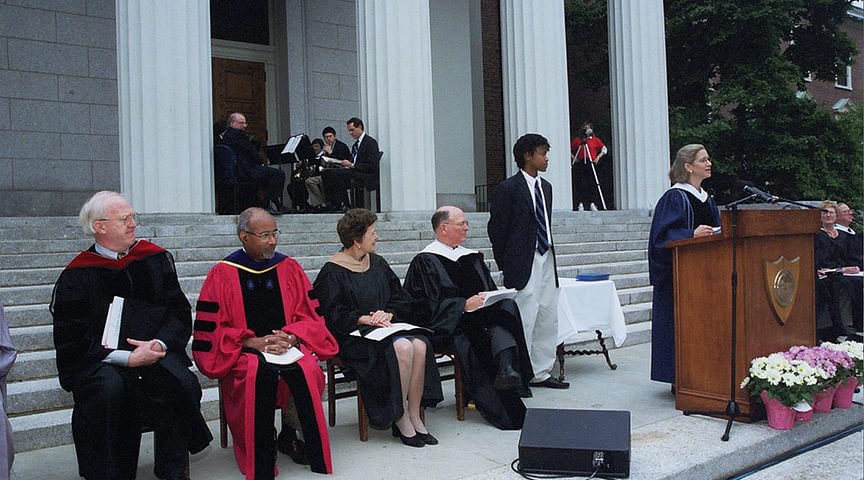
Phillips Academy’s first woman Head of School, Barbara Landis Chase addressed graduates in 2011 noting the challenges they would face nationally and globally.
“Socrates said that the unexamined life is not worth living. To live well, we must continue to question ourselves and others throughout our lives,” Chase said. “For in the end, we alone are responsible for our own integrity, for tending the internal flame that makes each of us the person we are.”




